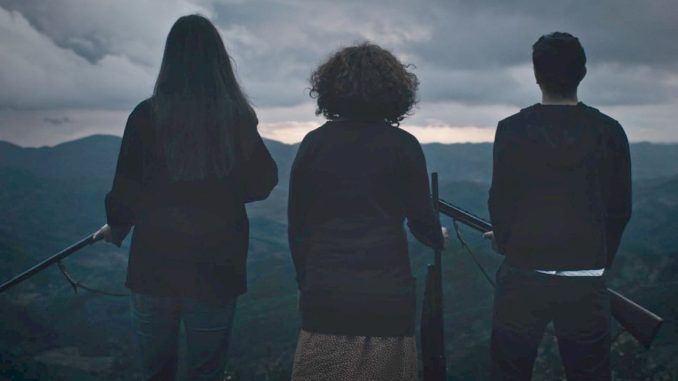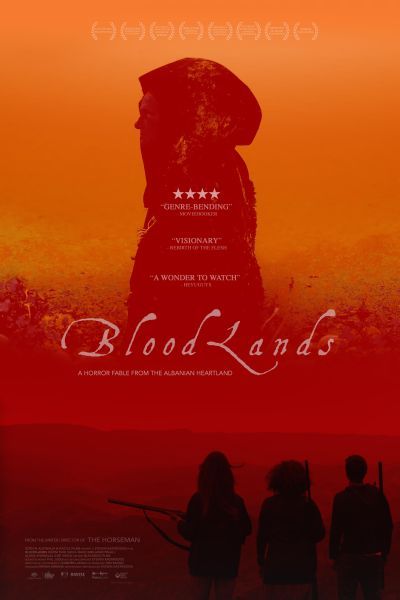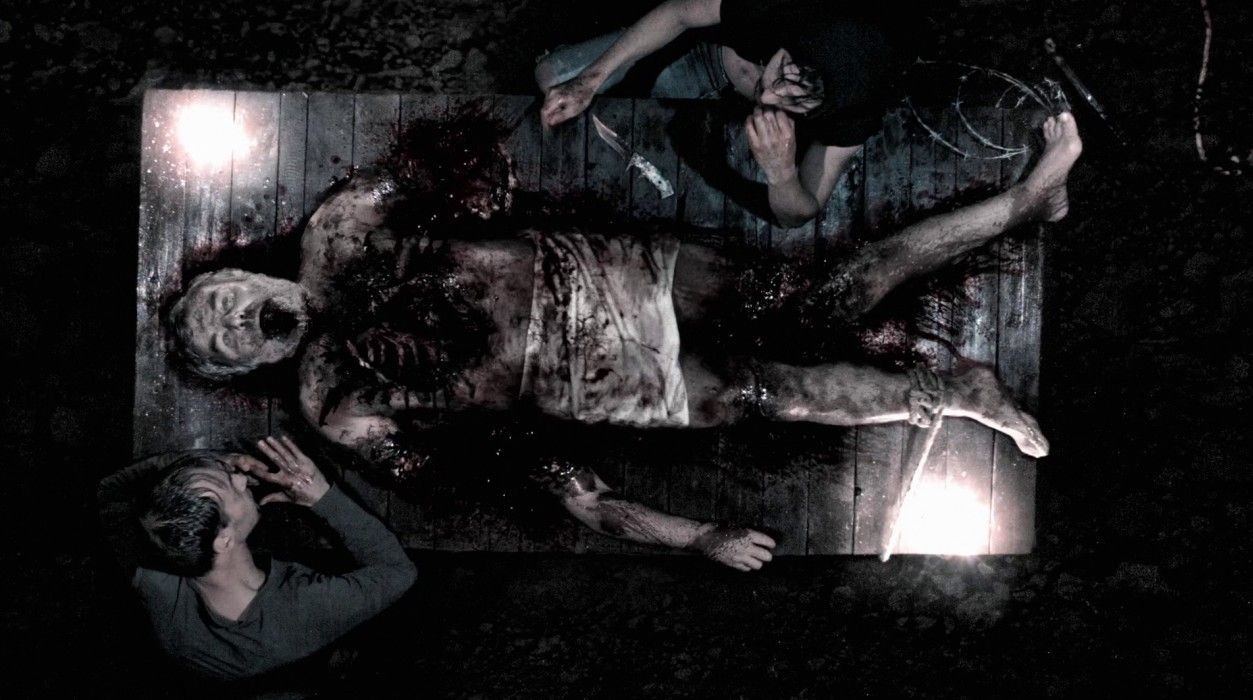
Rating: B
Dir: Steven Kastrissios
Star: Gëzim Rudi, Emiljano Palali, Suela Bako, Alesia Xhemalaj
Up until the Soviet Union and Yugoslavia splintered, Albania was solidly the poorest country in Europe. This will happen when you cling on to communism past its sell-by date, then have a government involved in pyramid schemes, whose collapse triggers a nation-wide revolt. Even now, the average salary is only about £625 per month. You will understand, therefore, why it hasn’t exactly been a hot-bed of European cinema. Though Eliza Dushku is second-generation Albanian on her father’s side, while the dad of Jim and John Belushi was born in Qytezë. But, excluding documentaries, the IMDb lists barely 350 features with Albania as the principal country of origin, the vast majority (243) of which are in the “drama” category.
Looking through the genre stuff, we get things like Drejt Fundit, whose IMDb synopsis, in its entirety, is “It’s first action movie in Albania.” Having seen the trailer, it looks to be a straightforward low-budget gangster film. The IMDb lists only two horror films: The Obsessed, which feels considerably more Italian than Albanian; and Vlog#13, still in post-production. Fortunately, the usual sources came through instead. I filed away for future reference Azemi, “a propaganda actioner made by Albanian-American immigrants” which the IMDb says is Kosovan, and also found Bloodlands, which the IMDb classifies primarily as Australian. Maybe by the rules of production it is. But when a film is in Albanian, shot in Albania with Albanian actors, and is heavily based on local culture… Yeah, I’m calling this one Albanian.
 I will admit to being severely out of my depth here, knowing little about the country, its people, or their society. Whenever I hear or see anything about Albania, it typically has either the words “gangsters” or “blood feud” somewhere in the same sentence. The most famous cinematic example, is probably Taken, where it was the Albanian mob who made the ill-advised decision to kidnap Liam Neeson’s daughter. They also showed up in rather good Belgian movie, Dossier K. The Albanian mafia is apparently particularly active there, though are present in most European countries. In the UK, they were involved in the 2006 Securitas robbery, where £53 million was stolen, but the thieves left behind £154 million because they couldn’t transport it.
I will admit to being severely out of my depth here, knowing little about the country, its people, or their society. Whenever I hear or see anything about Albania, it typically has either the words “gangsters” or “blood feud” somewhere in the same sentence. The most famous cinematic example, is probably Taken, where it was the Albanian mob who made the ill-advised decision to kidnap Liam Neeson’s daughter. They also showed up in rather good Belgian movie, Dossier K. The Albanian mafia is apparently particularly active there, though are present in most European countries. In the UK, they were involved in the 2006 Securitas robbery, where £53 million was stolen, but the thieves left behind £154 million because they couldn’t transport it.
There are no gangsters in this. There is, however, very much a blood feud, in line with an opening caption which explains, “Ancient Albanian canon, as written in the Kanun of Lek, dictates societal rules including marriage, property rights, hospitality and sanctioned murder. Modern Albania has largely forgotten this way of life…” The fact this explanation is necessary, should tell you that the film does not take place in modern Albania. Instead, it is set in s small, rural town, and focuses on the four members of one family. The father is Skender (Rudi), a butcher whose business is struggling to cope. It’s about one quiet month from going under, a prospect which deeply hurts his masculine pride: he rejects the offer of wife Shpresa (Bako) to start working.
There are two teenage children: son Artan (Palali) and daughter Iliriana (Xhemalaj), and both are affected by the migration endemic to rural Albania. The girl Artan likes has told him she’s going to leave and attend university in the capital, Tirana, while Iliriana has plans to leave the country entirely, and go work in Italy, where her cousin already resides. Skender is not happy with this: in his mind, women need to stay at home and raise kids, not wander the world. In the early going, this is almost kitchen-sink family drama, though with odd occurrences to suggest more is going on. Skender runs off a couple of vagabonds rummaging in the discarded offal from his shop, and sees a man in the street, whom he swears died years previously.
In particular, there are rumblings about a shtriga, a witch who lives in the nearby forest, though Skender dismisses these rumours as nonsense spread by Shpresa. Turns out, things are considerably darker than even her gossiping tongue can imagine. The witch oversees a cult of cannibalistic acolytes, and when one of them confronts Artan, dad is there to defend his son. With a shot-gun. So we are plunged thereafter into Albanian Plot B, with the cult members intent on extracting the permitted – indeed, almost socially required – revenge. Skender is abducted, and his looming fate is apparent: it exactly mirrors the bloody, real-life killing of a sheep we see at a slaughterhouse earlier on. Shpresa has to lead her children into the woods (top) to recover her husband, dead or alive (below).

Going through this series, the consistent theme has been, the ones I’ve enjoyed most are those with a genuine sense of place. We don’t need another shitty slasher, or feeble found-footage flick. Give me some local flavour, and this delivers it by the steaming bucket. It feels like life in this town hasn’t changed much over the last century, except for the kids having technology, much to Skender’s chagrin. Superstition still plays an important part in people’s lives. In this case, it’s entirely justifiable, because the more we learn about the shtriga and her acolytes, the creepier they become. They’re set up to be a formidable foe, particularly in the forests which are their home, though a resolute Shpresa proves a remarkably resilient opponent.
I would have preferred it the film had reached these genre elements earlier, perhaps instead of moping around with Artan and his camera, the final act feels a little rushed, when there’s potential for an extended battle between the two groups. However, what we get early on is still interesting, because it’s a glimpse into a world I hadn’t seen before, and that alone is enough to make it worthwhile. Much credit is due to Kastrissios, who is Australian, for creating something which feels authentically Albanian – though I’m hardly in any position to judge. Scenic Albania appears to be, although on the basis of this I couldn’t recommend it as a holiday destination. Particularly if you’re a sheep…
This review is part of our October 2024 feature, 31 More Countries of Horror.
